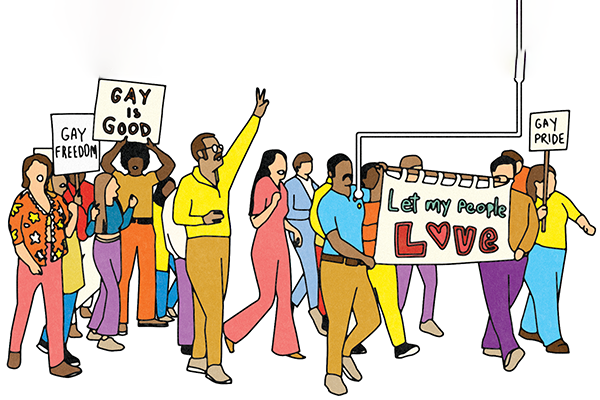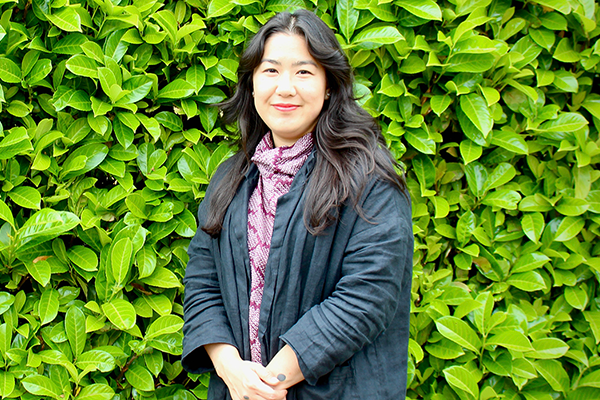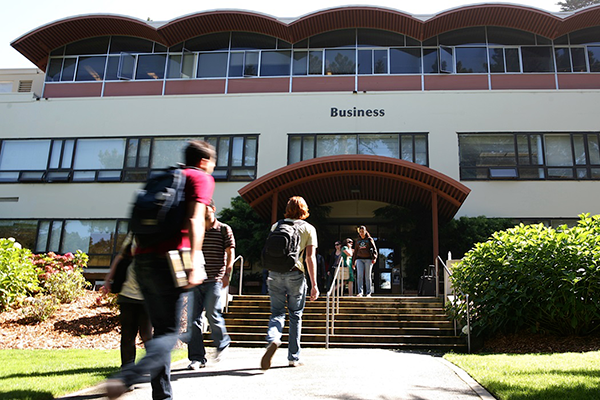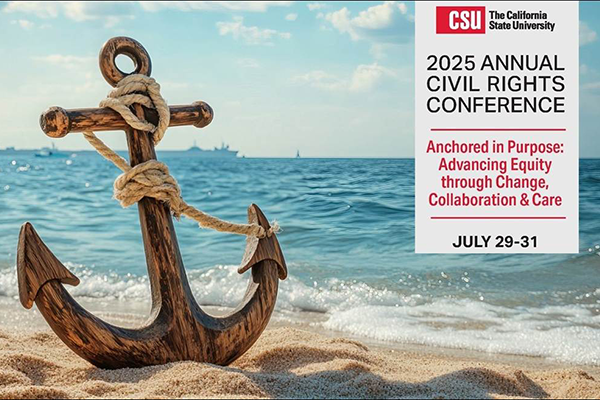News and Announcements

It was November 1970, amid antiwar protests and just a year and a half after a long and difficult student strike at San Francisco State College. The administration granted recognition to the Gay Liberation Front as an official student organization at a time when LGBTQ clubs did not exist in most colleges and universities.
“At one time even being gay could get a person thrown off campus,” Gay Liberation Front founder Charles Thorpe told the San Francisco Gay Press. “... This is another victory on our road to more liberation. ... In celebration a thousand lavender bunnies will be freed on campus within the next two weeks.”
The lavender bunnies never appeared, but future generations of Gators would feel less of a need to hide their identity.
Thorpe’s bold commentary is just one of dozens of anecdotes of San Francisco State University history in a new online exhibition, “Queer Transformations at SF State, 1969 – 1974,” on the OutHistory website. The exhibition also spotlights contributions from faculty pioneers such as Sally Gearhart and Morgan Pinney, folk musician Betty Kaplowitz (B.A., ’70) and antiwar advocate Gary Weinberg (B.A., ’72).
History Professor Marc Stein is the director of the website and the curator of the exhibit. More than 40 SFSU students contributed to researching it. SFSU’s Marcus Transformative Research Award and the Jamie and Phyllis Pasker Chair in U.S. History and Constitutional Law helped support the exhibit.
Stein notes that the student-led 1968 – 1969 Third World Liberation Front strike, which resulted in establishing the first-ever College of Ethnic Studies, inspired the LGBTQ liberation movement on campus and beyond.
“As it turns out, LGBTQ people participated in the strike and the strike inspired an upsurge in LGBTQ activism,” said Stein, president-elect of the Organization of American Historians. Thorpe, the Gay Liberation Front founder, was active in the strike and inspired by the civil rights movement, for example.
As a research assistant on “Queer Transformations at SF State,” Zach Greenberg (B.A., ’24; M.A., ’25) spent months reviewing bound volumes of archival SF State student newspapers. He added about 700 of the articles cited in the exhibition, in addition to fact checking, editing and contributing his own photographs.
“This provided useful training for me, but also it provided an example of the kind of work I’d like to do, which is making history publicly available,” said Greenberg, who won this year’s History Department Graduate Award for Distinguished Achievement. “It was very interesting to see San Francisco State students in the late 1960s and early 1970s around my own age, take up very important activism and coming out as queer people — at significant risk to themselves.”
View the “Queer Transformations at San Francisco” online exhibition. (Advisory: The exhibition includes nudity, explicit language and hate speech.)
Illustration by Elena Lacy

SFSU has named incoming Assistant Professor of Asian American Studies Cassie Miura as the inaugural Distinguished Chair in Nikkei Studies. Miura's role as chair begins August 2025 and will focus on advancing the awareness, understanding and appreciation of Japanese American experiences.
In May 2024, SFSU announced a $4.2 million gift from the Henri and Tomoye Takahashi Charitable Foundation to establish the Takahashi Distinguished Chair in Nikkei Studies. This faculty position is the first endowed chair in the University’s College of Ethnic Studies. It is also the first in the Asian American Studies department, which is the oldest and largest in the country and is at the forefront of curriculum development used by schools and universities nationwide.
“We are deeply honored to have Dr. Miura join our faculty and play a critical role in advancing Nikkei Studies,” College of Ethnic Studies Dean Grace Yoo said. “With her extensive background in Asian American Studies, particularly in Japanese American and Nikkei literature as well as Okinawan diasporic identity, Cassie will be instrumental to our college and University.”
Nikkei Studies centers the history, culture and experiences of the global Japanese diaspora and its intersectional communities. In Miura’s role, she will focus on increasing awareness, understanding and appreciation of the historical and contemporary experiences of Japanese Americans and the worldwide Nikkei diaspora.
“One major aspect of this position is focusing on strengthening the relationship between the University and the broader community,” Professor and Chair of Asian American Studies Wesley Ueunten said. “Dr. Miura will help strengthen that relationship so people within and outside our campus community have opportunities to engage with and learn about Nikkei Studies.”
Other duties include:
- Collaborating and exchanging ideas with national and international scholars in Nikkei Studies
- Leading the development of curricula and resources for teaching Nikkei Studies at the university and K-12 school levels nationwide
- Advancing frameworks of social justice and self-determination in advancing Nikkei Studies
- Promoting Nikkei Studies on campus and engaging with the Nikkei community in the Bay Area and beyond
“This position is an opportunity of a lifetime, and I’m eager to build relationships and get to work. On one hand, the history of World War II Japanese American incarceration remains vital to understanding contemporary issues, especially the rise of anti-Asian and xenophobic racism in the United States today,” Miura said. “On the other hand, I regard Nikkei Studies as an evolving transnational field with room to engage more deeply with feminist, queer and Indigenous perspectives. Given the longstanding commitment to self-determination on the part of SFSU’s College of Ethnic Studies, I can think of no better place to situate my work.”
Prior to coming to SFSU, Miura was an associate teaching professor of culture, arts and communication in the School of Interdisciplinary Arts and Sciences at the University of Washington Tacoma. There she also served as director of grants and special projects for the Office of Equity and Inclusion and co-principal investigator of the AAPI THRIVE Project, which was funded by a $2 million grant by the U.S. Department of Education’s AANAPISI (Asian American and Native American Pacific Islander Serving Institutions) Program.
Miura holds a Ph.D. in Comparative Literature from the University of Michigan, and her research and teaching interests include Okinawan diasporic identity, Japanese American and Nikkei literature and more. Miura is a yonsei (fourth generation) Okinawan and Japanese American born on the island of Kauaʻi and raised mostly in the Pacific Northwest.
Please visit the SFSU website to learn more about the Asian American Studies Department.
Photo by Chloë Yemiko Erickson

The Lam Family College of Business at SFSU proudly announces its reaccreditation by AACSB International — the Association to Advance Collegiate Schools of Business — a prestigious distinction it has held since 1964. This global standard of excellence places the college among a select group of distinguished institutions that have demonstrated a sustained commitment to high quality, innovation and meaningful impact in business education.
AACSB accreditation is the hallmark of excellence in business education and is earned by fewer than 6% of the world’s business schools. It ensures that students receive a rigorous, relevant education that prepares them for leadership in a rapidly changing global economy.
“This continued accreditation is a testament to the outstanding efforts of our faculty, staff, students, alumni and industry partners,” said Lam Family College of Business Dean Eugene Sivadas, Ph.D. “It reflects our shared commitment to academic excellence, global engagement, student success and an entrepreneurial spirit.”
Associate Dean Yim-Yu Wong, Ph.D., added, “Since first earning accreditation over six decades ago, the Lam Family College of Business has remained deeply rooted in its role as a cornerstone institution in the heart of San Francisco.”
With a comprehensive set of undergraduate and graduate degree and certificate programs, the college enrolls over 3,600 students and offers breadth and depth in its curricular offerings. The college emphasizes experiential learning, responsible leadership, entrepreneurship, sustainability and inclusive innovation. Signature initiatives, such as the Lam-Larsen Innovation and Entrepreneurship Initiatives, the Lam-Larsen Financial Technology (Fintech) Initiative and dedicated student spaces like the Innovation Hub and the DEIB (Diversity, Equity, Inclusion and Belonging) Lounge, exemplify the college’s hands-on, student-centered approach.
AACSB’s global network connects institutions committed to shaping the future of business education through high-impact teaching and research. The Lam Family College of Business is proud to be part of this elite network, preparing students not only to thrive in the workforce but to lead with purpose.
“Our AACSB accreditation reinforces the value of an SFSU business degree and reflects our college’s vision of empowering students to transform their lives and communities through their education,” said Senior Assistant Dean for Accreditation Lihua Wang.
The Lam Family College of Business remains accredited through its next review cycle of 2030 and looks forward to continuing its legacy of excellence as a vital contributor to SFSU’s mission of access, opportunity and equity.
In early May, President Mahoney shared information about the San Francisco Bay Region Network (“the Network”). As you may recall, the Network was established to create a unified infrastructure for transactional activities and services typically located in Administration and Finance across three Bay Area California State Universities — San Francisco State, Cal State East Bay and Sonoma State. This collaborative effort represents an innovative response to the shared budgetary challenges and demographic shifts facing all three campuses.
At the same time, the California State University (CSU) system is advancing the Multi-University Collaboration Initiative (“the Initiative”), which aims to strategically address systemwide cost structures by maximizing resources while meeting the unique needs of each university. The Initiative will enable the CSU to save or avoid costs, streamline and simplify processes, enhance the quality and efficiency of customer service and increase economies of scale. The CSU’s currently decentralized operations offer opportunities to collaborate and rethink how some of our work is completed. By fostering collaboration across the CSU in strategic areas, the CSU aims to create a more sustainable and effective operating model. Additionally, the Initiative will enable the CSU to better support student success and maintain its commitment to academic excellence.
Launched in August 2023, the Initiative arose from CSU presidents’ desire to explore new ways to collaborate across the system. Key opportunities for increased functional collaboration were initially identified through focus groups, workshops and interviews with representatives across the system. Through continued analysis and discussion led by the Initiative’s steering committee — which is composed of presidents and leaders across functional areas and universities — the CSU selected three focus areas for the first wave of design and implementation: benefits administration, information security and procurement. These focus areas were selected for their potential to significantly impact cost management and operational efficiency. Parallel efforts in areas like financial aid, Title IX and academic programming are also underway, and additional opportunities identified will be revisited in the future.
While the Network is a regionally focused collaboration among three campuses, the Initiative is a systemwide effort involving all CSU campuses. Both efforts seek to improve operational sustainability and reflect a shared commitment to innovation, efficiency, and student success. Our participation in both efforts demonstrates our support for systemwide progress, even as we dedicate primary attention to realizing the goals of the San Francisco Bay Region Network.
For more detailed information and updates on the Initiative, please visit the CSU’s dedicated Multi-University Collaboration Initiative website. If you have specific questions or feedback to share, please reach out to the Multi-University Collaboration Initiative team by emailing university-collaboration@calstate.edu or by filling out this anonymous pulse survey. More information about the Network will be shared as the work advances.
Want to join in on the fun of Move-in Day and help students and their families have a great Move-in Day experience? Sign up to be a Move-in Day ambassador on Tuesday, Aug. 19, or Wednesday, Aug. 20. Ambassadors will help with wayfinding, answering questions and welcoming residents. Lunch will be provided. Half and full day shifts are available.
Please sign up to be a Move-in Day ambassador via Qualtrics.
On Tuesday, Aug. 19, and Wednesday, Aug. 20, the campus will welcome new residents to the housing community for the 2025 – 2026 academic year. In preparation for their arrival, please be aware that there will be higher than normal traffic congestion in and around the campus perimeter (particularly State Drive, Lake Merced Boulevard and Holloway Avenue). In addition, Lots 19 and 20 (floors 1 – 3 and top floor) and some street parking may be restricted.
All SF State faculty, postdocs and graduate students can receive free membership to the National Center for Faculty Development and Diversity. It is a nationally recognized, independent organization that provides online career development and mentoring resources for faculty, postdocs and graduate students.
Resources include “Weekly Monday Motivator,” access to multiweek courses, moderated writing challenges including summer writing challenges, webinars and access to the member library. Benefits are valued at $495 per year, but are free to SF State members.
Please visit the Faculty Affairs website for instructions on how to activate your membership. For questions, please email campus coordinator Anoshua Chaudhuri at anoshua@sfsu.edu.
Those looking for professional learning opportunities around culturally responsive pedagogy are encouraged to take Center for Equity and Excellence in Teaching and Learning (CEETL)’s asynchronous course, “Return of JEDI PIE: A New Hope.” This is the first course, or “slice one,” in the Return of JEDI PIE certificate program.
A badge will be awarded to those who complete this asynchronous course. It is a prerequisite for the second course that will launch this fall.
SF State undergraduates have until Friday, Aug. 1, to apply for College Corps 2025 – 2026. Fellows earn up to $10,500 for 450 hours of service in food security, climate action, K – 12 education or economic opportunity. It is open to full-time undergraduates in all majors, including AB 540/California Dream Act students.
Presentations: How to make positive connections, foster respect and be a champion | July 16 – Aug. 1
Human Resources invites all employees to learning presentations offered virtually:
- Wednesday July 16, 10 a.m.: “CSU’s Got Talent: A Culture of Service: Inspiring Positive Connections Campus-wide”
- Friday, July 18, 11 a.m.: “Respect in a Diverse Workplace”
- Friday, Aug. 1, 11 a.m.: “Being a Champion: Strategies for Getting Ahead”

CSU Civil Rights Programming and Services invites the campus community to its free conference “Anchored in Purpose: Advancing Equity through Collaboration, Change and Care” beginning Tuesday, July 29. Offered via Zoom, afternoon sessions are open to all CSU employees.
The CSU is trying something new this year. Previously, this event has been solely focused on the importance of bringing together CSU civil rights practitioners (administrators, coordinators and staff of Title IX discrimination, harassment and retaliation) for group discussions, professional development and training.
Please register via Zoom for the CSU Civil Rights Conference by Wednesday, July 23. Please see PDF for registration instructions.
For questions, please email Sue McCarthy at smccarthy@calstate.edu or Marie Sorensen at msorensen@calstate.edu.
The SFSU AI Literacy Education Program facilitates artificial intelligence (AI) workshops over the summer. Engage in guided inquiry of this emerging technology, catch up on your digital badging progress or level up your understanding of generative AI during the summer months.
August courses:
- Wednesday, Aug. 6, 11 a.m. – 12:30 p.m.: “Generative AI for Visual Design”
- Wednesday, Aug. 13, 11 a.m. – 12:30 p.m.: “AI Literacy Essentials: Introduction to Generative AI”
- Thursday, Aug. 14, 2 – 3:30 p.m.: “Working with AI” (staff elective)
Please visit the AI Literacy Education page for full course listings and to register.
Human Resources will host a presentation on the CSU Employee Tuition Reduction/Fee-Waiver program on Friday, Aug. 8, 11 a.m. – noon, via Zoom. This employee benefit provides an opportunity for eligible employees or their dependents to take classes at any CSU campus at a reduced rate. For employees, this can help with career development, undergraduate or graduate degrees.
Please register via Qualtrics for the fee-waiver presentation.
Staff are invited to the first Staff Forum of the fall 2025 semester on Wednesday, Aug. 20, 11 a.m. – noon, via Zoom. All SFSU staff, except management personnel plan employees and faculty, are encouraged to attend.
The Aug. 20 forum will include President Lynn Mahoney for opening remarks, information needed to get the year started and an update from the Equity Programs and Compliance Office.
Human Resources offers these forums monthly during the semester.
To opt into all Staff Forums and for the Zoom link, please RSVP via Qualtrics.
Welcome 300 new Gators to SFSU! Join the First-Year Experience Program to help staff a field trip exploring our beautiful city of San Francisco on Friday, Aug. 22, 9 a.m. – 5 p.m.
The program’s course, All University 110: “Living in San Francisco,” is being offered for a second year. From Tuesday, Aug. 19, to Aug. 22, about 300 freshmen and transfer students will participate in this one-unit course. The course is designed to equip them with tools for academic and personal success, teach them how to use the Gator Pass and navigate public transportation, and introduce them to the iconic sights, sounds and culture of San Francisco.
For Aug. 22, the program seeks volunteers to lead small groups on public transit to pre-planned destinations around the city. A 30-minute Zoom training will be held between Monday, Aug. 11, and Friday, Aug. 15.
Please sign up for “Living in San Francisco” via Google Forms.
For questions, please email Susanna Jones at susjones@sfsu.edu.
SF State Spotlight
A video produced by the Office of Strategic Marketing and Communications has won a gold Circle of Excellence Award from the Council for Advancement and Support of Education. The 72-second music video features more than 15 students dancing in each of SFSU’s residential communities, from courtyard to hallway, kitchenette to laundry room.
The production team comprised Videographer Juan Montes, Senior Strategic Communications Specialist Matt Itelson, Digital Community and Multimedia Specialist Tess Stevens and Student Production Assistant Corinne Allen. Associate Director of Creative Services Spring Nguyen and Director of Marketing and Brand Strategy Barbara Stein supervised the project. Other staff members served as onscreen talent and choreographers, including Digital Content Specialist Kevin Perez, Graphic Designer Alfredo Arzola Ibarra, Web Producer Cecilia Cao and Alumni Relations/Annual Giving Coordinator Paolo Maralit.
Associate Professor of Nutrition and Dietetics Zubaida Qamar was recently featured in a KQED article highlighting fruit picking in the Bay Area. The piece explores the benefits of seasonal eating, supporting local farms and increasing access to fresh produce through programs like Market Match.
“The flavor is going to be much more enhanced if we are buying seasonally and locally — and you’re also supporting your local farmers,” she said.
Anoshua Chaudhuri, senior director of the Center for Equity and Excellence in Teaching and Learning, was quoted in a Mission Local article on July 1 assessing the state of small businesses in San Francisco. Chaudhuri led survey efforts to understand post-pandemic effects and recovery of small businesses in the city. She helps small businesses assess their economic impacts.
A new paper in the American Journal of Clinical Pathology reports the most extensive study on patients with multiple myeloma receiving daratumumab (DARA) and transfusion. The team included Lecturer Faculty and Lab Instructor Antonio Insigne and UCSF researchers.
Although DARA is intended to target a protein on myeloma cells, it can also bind to red blood cells and interfere with pretransfusion testing, a process that can be laborious and costly. In this study, researchers assessed data from 850 patients, 20% of whom received at least one red blood cell transfusion over nine years. They propose an optimized pretransfusion strategy that can reduce turnaround time and cost. In the study population, there was no increase in alloimmunization risk.
James Dudley, lecturer faculty in Criminal Justice Studies, participated in a Police1 webinar on June 13 discussing safer and smarter responses for peace officers responding to mental health calls. The webinar offers actionable steps to evolve police response to mental health crisis calls, prioritizing both officer and community safety.
Matthew Clark Davison, lecturer faculty emeritus in Creative Writing, is co-author of “The Lab: Experiments in Writing Across Genre” (W.W. Norton and Co.) with Alice LaPlante, a former lecturer faculty member. Its 10 chapters and 90 exercises challenge writers to play with fiction, memoir and poetry — or push toward hybrid or entirely new forms.
In conjunction with the book’s publication, Davison and LaPlante wrote articles for LitHub and The Writer’s Chronicle. Davison will lead a generative writing workshop on Tuesday, July 22, at 7 p.m. at Booksmith in San Francisco.